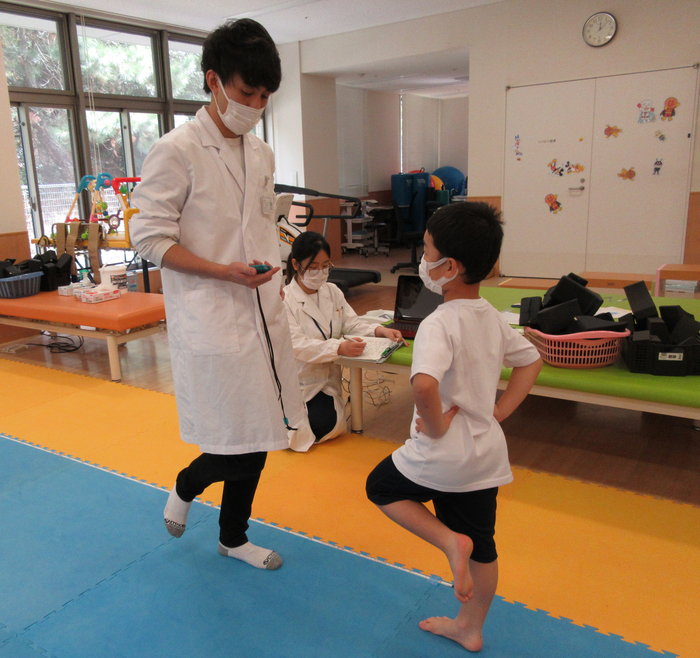A team of researchers from Nagoya University in central Japan investigated how restrictions on children’s activities during the COVID-19 pandemic affected their life habits and their abilities to perform physical activities. By comparing medical examination data before and after the onset of the pandemic, they found that physical functions among adolescents deteriorated, including their dynamic balance. They also found that the children had higher body fat levels and worse life habits. Rather than a lack of exercise time, this may have been because of a lack of quality exercise due to activity restrictions.

Credit: Credit must be given when image is used
A team of researchers from Nagoya University in central Japan investigated how restrictions on children’s activities during the COVID-19 pandemic affected their life habits and their abilities to perform physical activities. By comparing medical examination data before and after the onset of the pandemic, they found that physical functions among adolescents deteriorated, including their dynamic balance. They also found that the children had higher body fat levels and worse life habits. Rather than a lack of exercise time, this may have been because of a lack of quality exercise due to activity restrictions.
During the COVID-19 pandemic, in Japan, as in other countries, schools and sports clubs tried to prevent the spread of infection by reducing physical education and restricting outdoor physical activities, club activities, and sports. However, children who are denied opportunities for physical activity with social elements may develop bad habits. During the pandemic, children, like adults, increased the time they spent looking at television, smartphone, and computer screens, exercised less, and slept less. Such changes in lifestyle can harm adolescent bodies, leading to weight gain and health problems.
Visiting Researcher Tadashi Ito and Professor Hideshi Sugiura from the Department of Biological Functional Science at the Nagoya University Graduate School of Medicine, together with Dr. Yuji Ito from the Department of Pediatrics at Nagoya University Hospital, and Dr. Nobuhiko Ochi and Dr. Koji Noritake from Aichi Prefectural Mikawa Aoitori Medical and Rehabilitation Center for Developmental Disabilities, conducted a study of Japanese children and students in elementary and junior high schools, aged 9-15, by analyzing data from physical examinations before and during the COVID-19 pandemic. They evaluated the children’s muscle strength, dynamic balance functions, walking speed, body fat percentage, screen time, sleep time, quality of life, and physical activity time.
The researchers found that after the onset of the pandemic, children were more likely to have decreased balance ability when moving, larger body fat percentage, report spending more time looking at TV, computers or smartphones, and sleep less. Since there were no changes in the time spent on physical activity or the number of meals eaten, Sugiura and his colleagues suggest that the worsening of physical functions was related to the quality of exercise of the children. The researchers reported their findings in the International Journal of Environmental Research and Public Health.
“Since the outbreak of the novel coronavirus in Japan after April 2020, children have not been able to engage in sufficient physical education, sports activities, and outdoor play at school. It became clear that balance ability during movement was easily affected, lifestyle habits were disrupted, and the percentage of body fat was likely to increase,” explained Ito. “This may have been because of shorter outdoor playtime and club activities, which impeded children’s ability to learn the motor skills necessary to balance during movement.”
“Limitations on children’s opportunities for physical activity because of the outbreak of the novel coronavirus have had a significant impact on the development of physical function and lifestyle and may cause physical deterioration and health problems in the future,” warned Ito. “Especially, the risk of injury to children may increase because of a reduced dynamic balance function.”
The results suggest that even after the novel coronavirus becomes endemic, it is important to consider the effects of social restrictions on the body composition of adolescents. Since physical activities with a social element may be important for health, authorities should prioritize preventing the reduction of children’s physical inactivity and actively encourage them to play outdoors and exercise. The group has some recommendations for families worried about the effects of school closings and other coronavirus measures on their children. “It is important for children to practice dynamic balance ability, maintaining balance to avoid falling over while performing movements,” Ito advised. “To improve balance function in children, it is important to incorporate enhanced content, such as short-term exercise programs specifically designed to improve balance functions.”
Journal
International Journal of Environmental Research and Public Health
DOI
10.3390/ijerph191811513
Article Title
Physical functions among children before and during the COVID-19 pandemic: A prospective longitudinal observational study (stage 1)




